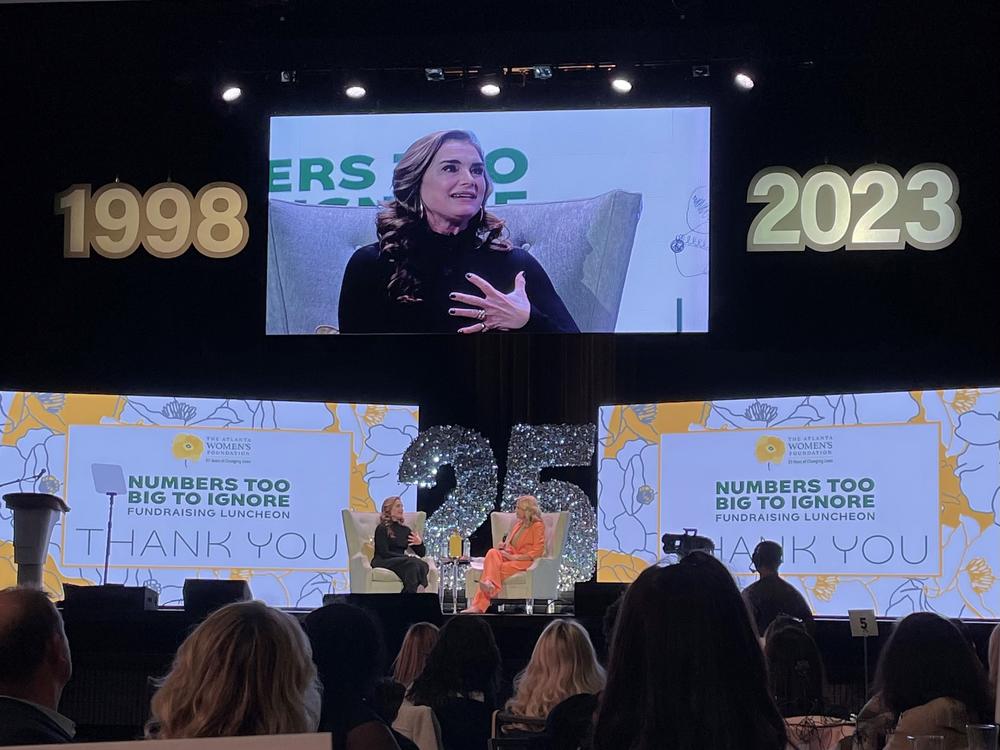
Caption
Actress and advocatebBrooke Shields speaks at a Nov. 2, 2023, luncheon with the Atlanta Women's Foundation.
Credit: Ellen Eldridge / GPB News

Actress and advocatebBrooke Shields speaks at a Nov. 2, 2023, luncheon with the Atlanta Women's Foundation.
Brooke Shields has been a model and an actress, but perhaps one of her most important roles involves her advocacy of women. Especially for her daughters.
Shields spoke last week at an Atlanta Women’s Foundation luncheon and fundraiser about empowering women and supporting their education and mental health.
By focusing on her own health and pursuing a college degree, Shields said she found confidence and independence.
“I don’t get backed into a corner,” she said. “That’s because of an education.”
What did shake Shields, in 2006, was postpartum depression (PPD).
The medical disorder affects an estimated 1 in 7 women and may stem from a genetic predisposition like a family history of depression or fluctuating hormone levels.
Close to 700 people in Georgia reported postpartum depressive symptoms in 2020, though the number of unreported cases likely makes that number much higher. Between 2015 and 2020, there were 28 deaths by suicide in Georgia where the person was “pregnant at time of death, within one year of death or not otherwise specified,” according to data from the Centers for Disease Control and Prevention.
Overall, Georgia has some of the highest rates of infant and maternal mortality in the country.
RELATED:
Perinatal mood and anxiety disorders (PMADs) constitute a spectrum of mental illnesses and are a leading complication of childbirth in the United States. An estimated 30,000 Georgia women experience these illnesses every year, according to the Georgia Department of Behavioral Health and Developmental Disabilities.
These disorders can affect all women, regardless of ethnicity, age, or socioeconomic status. Often, the term “postpartum depression” is used to generalize these conditions, but mothers can experience more than just depression.
In her case, Shields said it wasn’t easy to reach out, but doing so made her realize she didn’t need to feel ashamed or faulty because she couldn’t connect with her baby — she came to understand that PPD is not a failing but a biochemical reaction not unlike developing diabetes.
“Ask for help; this is not easy to do,” she said. “It does take a village.”
It matters for the village as well. Women experiencing postpartum depression and other PMADs incurred 90% higher health care costs than non-depressed women, according to a 2012 study on PPD and health care expenditures among employed women. In general, depression costs U.S. employers $44 billion a year in lost productivity and $12.4 billion in health care expenses.
As of 2010, more than half of mothers of infants participate in the labor force (56%), making these statistics especially significant.
“Maternal mental health must be taken into consideration, if not for the human and quality of life cost, for the economic savings,” according to the Mental Health of America’s Georgia chapter.
As many as half of the new mothers experiencing PPD fail to get a diagnosis because they don’t share their feelings with family members. Some women fear abandonment and lack of support.
“It's like you're either the sexy girl at the bar or you're in Depends. That's how the marketing is. And all the women I know even over 50 are just fabulous, right?” — Brooke Shields
Shields turned her experience into a book.
“I needed to do it for my daughter,” she said. “I needed to say that this is not something to be ashamed of. Ask for help.”
Speaking to a room filled with more than 1,600 women, Shields shared that one of her daughters recently said she was lonely. She reminded the young woman that, though we might come into the world and feel lonely, you're not alone.
Shields said after her past 23 years of being “just a mom,” she recently looked back on her life’s accomplishments.
“I really thought, 'Who am I now? What am I?'” she said. "And I just want women to give themselves a pat on the back and say, look how far you've come."
After overcoming adversities and sadness, Shields said there is still time to make a difference in the lives of other middle-aged women who might feel lost and at the mercy of marketing campaigns for health and beauty products.
“It's like you're either the sexy girl at the bar or you're in Depends,” she said. “That's how the marketing is. And all the women I know even over 50 are just fabulous, right?”
Women and girls are twice as likely to experience mental health challenges, and the number only increases for those living in poverty, according to the Atlanta Women’s Foundation. In addition to that, less than 2% of total U.S. charitable giving goes toward organizations working on behalf of women and girls.
"We're not petty, we're not afraid," she said. "And I always say, you know, this isn't, 'I am woman hear me roar.' It's more of 'I'm a woman, hear me more.'"
Shields said her next move involves more writing.
“I'm writing a book about women in this era of our lives, and it'll be partially a memoir, but also there will be other contributors,” she said. “We need to understand the facts about this part of our lives.”